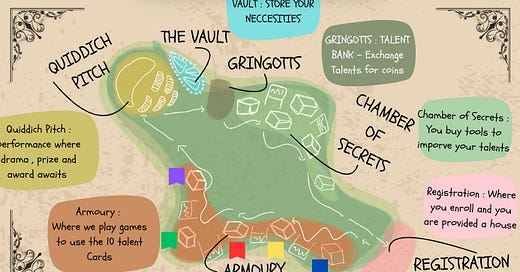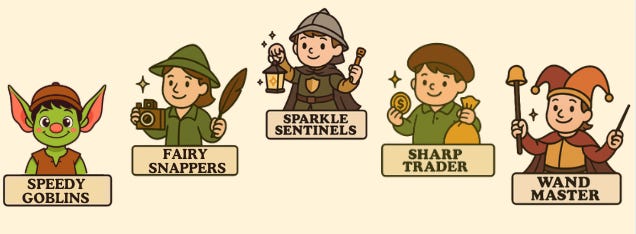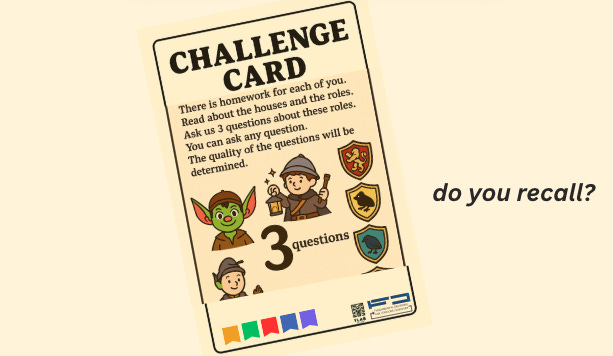25.06.17: THE RISE OF THE AMBASSADORS: A Training Tale Across Borders
Day 2 – and we stepped into the roles of each member and various houses, uncovering strengths, hesitations, and hidden leadership sparks.
Training Bootcamp Brief
In the digital corridors of a bustling Zoom room, a diverse team of young ambassadors from Vietnam, Bali, and Singapore gathered for a vital training session. Guided by lead facilitators—DAV79, ELF001 (affectionately known as "Elf"), and Wybie—this wasn’t just another virtual meeting. It was the next step in a larger, imaginative adventure: preparing for a global bootcamp centered around discovery, leadership, and critical questioning.
The morning began with a gentle check-in. DAV79 warmly welcomed participants, switching between English and Indonesian, ensuring everyone—especially the newer members like Victor—could follow along. Wybie was tasked with recapping the previous day’s activities. With a slightly shaky start, she eventually explained that the bootcamp was structured around a themed “story-world” that involved roleplay elements—goblins, snappers, talent cards, and mystery maps. Participants would be grouped into “houses,” embarking on missions that develop their mindset, leadership, and collaboration skills.
The structure was clear: Day 3 of the bootcamp in Bac Ninh, Vietnam would be the climax. Elf described it vividly—a magical village where participants would register, be assigned a house, earn talent cards through playful challenges, and eventually trade them for coin-based tools in the “Chamber of Secrets.” There would even be performance sections—dramatic skits, award ceremonies, and the chance to showcase personal growth.
As this world-building unfolded, DAV79 repeatedly emphasized clarity and confidence in communication. Wybie and Elf were encouraged to speak louder, articulate better, and lead with energy. After all, they weren’t just guiding a bootcamp—they were facilitating a live learning experience with students from four countries.
The next portion of the session focused on accountability and progress tracking. Elf shared a scoreboard showcasing which participants had completed their “homework”—a series of readings, reflections, and questions posted on a shared platform. Names like Anguma, Jessica, Ari, and Aliya were celebrated for their efforts. DAV79 noted that this wasn’t merely about participation—it was about engagement. Those who failed to comment on assigned readings, like Richard and Emma, risked falling behind in the scoring system and losing eligibility for ambassador roles.
Wybie explained the houses and the roles during the Day 3.
🟥 G Gryffindor – The Brave Pathfinders
Color: Red
Core Traits:
Courage: They step up boldly to face challenges.
Commitment: They stay dedicated to their goals, even when it’s tough.
Impact: They aim to grow with purpose and leave a positive mark.
🧭 Ideal for those who take initiative, bounce back from failure, and want to inspire others by action.
🟨 H Hufflepuff – The Heartful Companions
Color: Yellow
Core Traits:
Empathy: They support others’ growth with sincerity and warmth.
Patience: Calm and steady in turbulent moments.
Fairness: Honest players who believe in balance and unbiased effort.
🧸 Perfect for team players who value kindness, justice, and building safe spaces for all.
🟦 R Ravenclaw – The Curious Creators
Color: Blue
Core Traits:
Creativity: They think differently and bring fresh ideas.
Open-mindedness: Deep thinkers who consider many perspectives.
Curiosity: Always asking, exploring, and seeking the unknown.
🔍 Best for problem solvers, tinkerers, researchers, and dreamers of “what if.”
🟩 S Slytherin – The Visionary Climbers
Color: Green
Core Traits:
Dynamic Framework: Agile thinkers who adapt and break limits.
Clear Intention: Strategic, focused, and purpose-driven.
Growth Mindset: Always pushing for the next level through bold journeys.
🚀 Made for ambitious minds who love to design their own path to success.
🟪 E Emberlynx – The Wild Explorers
Color: Purple
Core Traits:
Exploration: They thrive on discovery and the unfamiliar.
Experiment to See, Not to Prove: They test ideas with an open heart—not ego.
Intuition: They trust their inner compass and follow raw insight.
🌌 Perfect for pioneers, experimenters, and those shaping a new identity in motion.
Wybie then went on the explain the roles…..
1. Speedy Goblins
Role: Agile problem-solvers
Traits: Fast, clever, and action-oriented. They dash through challenges, collect the challenges, and keep momentum high.
Think of them as: Mission runners or talent collectors. they work for the bank.
2. Fairy Snappers
Role: Story collectors and memory keepers
Traits: Observant and creative, they capture key moments through photos and journaling.
Think of them as: Media reporters or visual storytellers. They work for the newsletter.
3. Sparkle Sentinels
Role: Guardians of spirit and teamwork
Traits: Protective, thoughtful, and alert. They ensure group morale stays strong and everyone feels seen and safe.
Think of them as: Emotional anchors and silent leaders. They work for the mystical guards.
4. Sharp Traders
Role: Strategists of resources and exchange
Traits: Calculated, resourceful, and persuasive. They trade, negotiate, and make smart decisions to gain tools or power-ups.
Think of them as: Economic brains and value optimizers. They work at the chamber of secrets.
5. Wand Masters
Role: Game facilitators and magic sparkers
Traits: Imaginative, confident, and adaptable. They guide missions, explain rules, and energize the flow of the bootcamp.
Think of them as: Hosts, emcees, or quest masters. They work at the armoury
Richard raised an important question: “Can we choose our own house or role, or will it be assigned to us?”
Both WYBIE and DAV79 clarified that while participants are encouraged to express their preferences—especially for roles—final placements would ultimately depend on the quality of their engagement and contributions.
To illustrate the point, DAV79 turned to Emma and asked, “Which house would you like to join?”
Emma responded with her usual hesitation, “I don’t know.” She then added that she would simply follow her brother’s choice.
With a smile but a clear boundary, DAV79 replied, “Each of you will be in different houses. If you’re unsure or undecided, the team will assign one for you.”
The message was clear: own your choices—or the team will guide you.
A special mechanism had been introduced to gamify learning: Power Cards and Daily Challenges. As Elf explained, students who completed activities with depth and creativity could earn talent cards—later traded for virtual currency used to “buy” growth tools. DAV79 also mentioned the upcoming launch of a grading dashboard, which would give participants a clear breakdown of their contributions.
Amidst the logistics, DAV79 often wove in lessons about mindset and intentional learning. Participants weren’t just completing tasks—they were being asked to reflect, to ask smart questions, and to show personal growth. He encouraged ambassadors to use platforms like Canva to create storyboards, post reflections, and link them to the bootcamp’s shared padlet. These updates would be printed out and displayed at the bootcamp event, where peers could vote by placing stickers and hearts on posts they admired.
Then came the lesson on questions—a moment that felt more like a masterclass in thinking than training. DAV79 introduced a tiered system of evaluating the quality of questions, inspired by Simon Sinek’s "Start With Why" model:
Level 1: What questions (e.g., "What is a global citizen?") earned 1 point.
Level 2: How questions (e.g., "How do you become a global citizen?") earned 2 points.
Level 3: Why questions (e.g., "Why is being a global citizen important today?") earned 3 points.
To illustrate, he asked Anguma and Ari to come up with questions on the spot—evaluating each based on depth and relevance. Wybie also contributed, reflecting that the depth and intent behind a question matter more than the length. “Surface-level thinking,” she said, “won’t help you discover anything new.”
Elf chimed in again to reinforce that questions weren’t just tasks—they were proof of understanding. She wanted the ambassadors to write down reflections, add new perspectives, and connect personal experiences to global themes. “Show us how you think,” she urged. “We want to know you better—not just your answers, but your voice.”
With so many moving pieces, some confusion emerged. Connections dropped. Voices glitched. Participants lost track. But DAV79 maintained a steady rhythm—patiently repeating, slowing down, and gently nudging the team forward. His mantra was clear: “Clarity, speed, and intent. You must speak clearly, respond quickly, and think deeply.”
Immediately after, DAV79 said, There is a CHALLENGE CARD: Know Your House, Own Your Role
📚 Your Mission:
Dive into the descriptions of the Houses and Roles.
📝 Your Task:
Ask 3 questions based on what you’ve read about the 5 houses and the
These can be about:
The meaning of a specific trait
How a role works during the bootcamp
Which house or role might fit you best ( you are being trained to be leaders so you are supposed to lead independently)
Anything you’re curious about!
🎯 Reminder:
We’re not just counting questions — we’re looking at the quality.
✔️ A simple “What is ___?” = Level 1 - 1 point
✔️ A thoughtful “How does ___ help in teamwork?” = Level 2 - 2 points
✔️ A reflective “Why is ___ important in leadership?” = Level 3 - 3 points
💬 Ask Boldly. Think Deeply. Grow Sharply. The better the depth of your questions - the better your score.
ELF001 and Wybie were asked to place these challenges on the Q board for the members to respond to the question.
By the end of the session, a few things stood tall:
Anguma’s homework stood out. Both Elf and DAV79 praised her writing for its clarity, depth, and creativity. “She’s definitely a writer,” Elf noted. “And that helps us know where to place her in the team.” Also - she was helping to upload others work. hmmmm thats a good start - but she has to get others to load the work themselves. If she offers to do that - she might make others lazy. At that point this might make others lazy. Questions from Anguma were more towards the global citizen theory and it had to be more towards the discussion.
Jessica’s questions were insightful. She and Ari were recognized for their contributions to the game planning and bootcamp design.
Wybie learned to lead. Despite some early shakiness, he grew more confident as she shared screens, answered questions, and helped explain structures.
The team wrapped up with a call to action: complete your reflections, read the chapters, ask questions, and post your stories online. Only then would they be ready for the real magic of Day 3—when all countries would come together in Bac Ninh and bring the vision to life.
In the final moments, DAV79 reiterated that every comment mattered, every question counted, and every bit of creative energy would shape the bootcamp experience. For these ambassadors, the journey ahead wasn’t just about performance—it was about learning how to lead, how to think, and how to ask the right questions.
Evaluation
Wybie
Wybie took initiative by explaining the houses and roles, assisting with screen sharing, and providing structural support. His communication was helpful and supportive, though he needs improvement in voice modulation and confidence. His engagement level was high, and she adapted well to the facilitation role. He demonstrated a growing mindset and earned a contribution rating of 8.0/10.ELF001
ELF001 effectively summarized activities, guided the agenda, and explained the scoring and evaluation systems. Her communication style was friendly and informative. Despite minor connectivity issues, she was actively involved and encouraged others. She demonstrated initiative and clarity, earning a contribution rating of 8.5/10.Anguma
Anguma submitted thoughtful and well-developed homework, indicating strong reflective thinking. However, during the live session, she appeared hesitant and lacked clarity in verbal responses. Her engagement was moderate, with stronger written than spoken contributions. Her mindset growth was evident in writing, and she received a score of 7.5/10.Emma
Emma was polite and present but lacked proactive engagement. She showed indecision (e.g., deferring house choice to her brother) and rarely contributed verbally unless prompted. Her communication was quiet and unsure, showing signs of early growth mindset development. She earned a contribution rating of 5.0/10.Richard
Richard asked a thoughtful question about house and role selection, indicating some curiosity. However, he did not participate further and missed homework submissions. His engagement was low, and while his communication was brief, it was neutral. His mindset indicators were minimal, and he received a score of 4.5/10.Ary
Ary played a supportive role by translating and summarizing in Indonesian. She responded when called upon and showed willingness to clarify and assist. Her communication was bilingual but at times hesitant. Her engagement was moderate and contribution score was 6.5/10.Omitha
Omitha name was mentioned - but she was not entirely present - she only played the support role for Ary. 2/10Sri
Sri participated when prompted but struggled with clarity and memory, suggesting a lack of preparation. Her communication was soft-spoken and uncertain. She showed signs of wanting to learn but needs more internalization of content. Her contribution was rated 5.5/10.Jesika
Jesika was present and submitted early homework but was extremely shy during the live session. She often said she didn’t understand and refrained from engaging further. Her communication was very hesitant, and while she showed willingness in writing, she needs significant confidence-building. Her score was 5.0/10.Purnama
Though listed as a helper and present in the call, Purnama did not speak or respond when addressed. Her engagement was very low, and her communication was silent. As such, there were no observable indicators of mindset development. She received a score of 4.5/10.Aliya
Aliya answered a quiz question correctly and participated in small ways (e.g., selecting a house color). Her communication was clear but brief. She followed instructions and showed basic understanding of the session structure. Her contribution was scored at 5.5/10.Victor
Victor confirmed audio and presence but did not ask questions or engage further. His communication was minimalist and passive. There were no clear indicators of learning or growth mindset in the session. He was scored at 3.5/10.Leonita
Leonita responded politely when addressed and admitted to confusion, showing honesty but limited preparation. She did not contribute to the discussion and remained hesitant. Her mindset indicators were limited due to low engagement, and she received a 4.5/10.Ella
Ella was warm and willing but did not ask questions when prompted. She stayed silent through much of the session and needs encouragement to be more vocal. Her growth mindset could not be clearly observed, leading to a score of 4.0/10.DAV79
Had glitches with the network and failed to prepare an alternative plan - leading to a score 6/10
And so, the virtual session ended—not as a conclusion, but as the opening chapter in a grand, unfolding tale of discovery. Remember to do your Challenge - the homework.
Jun 18 agenda
Recap of Jun 16 - 5 min
Review of Homework and the - the challenge card . What was a good question - 5 min ( JFP)
Review of the Story Board - by a random member - be ready - 10 min (JFP to select and summarise)
Review of the Games - ELF - 10 min ( ask participants to provide ideas)
Review of the Merchandise - ELF - 10 min ( ask participants to provide ideas)
Challenge Card - Wybie - 5 min
QnA - Wybie - 5 min
JOIN ON TIME - SPEAK UP - BOLD AND CLEAR.








This makes me wonder, why is the map formed like that? And how is it formed?
This session was fun because it discussed roles and team divisions.At first I didn't understand what David was asking and saying, but luckily there was Mr. Putu who helped me translate it.To be honest, I felt a little scared and nervous when Mr. David asked, because his vocabulary and language were quite difficult to understand.